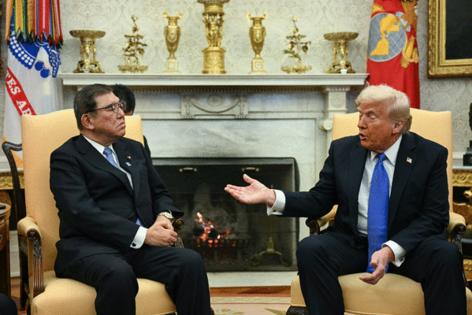Japan won't wait for G-7 Summit for possible US trade deal
Published in News & Features
Japan won’t necessarily wait for the Group of Seven Summit set to take place in Canada next week to seal a trade deal with the U.S. if the two sides can agree earlier, Japan’s top negotiator Ryosei Akazawa said in Washington, D.C. on Friday.
Trade discussions between Japan and the U.S. have “progressed” but have not yet reached a consensus on a deal to revisit sweeping U.S. tariffs, he said after the fifth round of trade talks that included U.S. Treasury Secretary Scott Bessent and Commerce Secretary Howard Lutnick. The negotiations come a week before Japanese Prime Minister Shigeru Ishiba is set to depart for the G7 in what he said could be a “milestone” for the talks.
Akazawa did not signal that a deal was imminent but said an agreement will be reached as quickly as possible and emphasized the daily economic damage the tariffs inflict on Japan’s economy. He added that there were no plans as of yet for when the next trade meeting may be.
“If the tariffs can be revised, we have absolutely no intention of waiting” until the G-7 summit, Akazawa said. “We are negotiating with the aim to stop the impact on the Japanese economy as soon as possible, whether it’s by a day or by hours or even a second.”
A government official who briefed the media in Washington indicated that there’s likely to be further talks between Akazawa and his counterparts before a formal agreement between Ishiba and U.S. President Donald Trump.
Trump aims to use tariffs as a negotiation tool to balance the U.S. trade deficits with other nations including Japan. He implemented a 25% tariff on imports of cars and car parts from around the world. As with other nations, Japan also saw a doubling of the steel and aluminum levy to 50% this week, and a 10% across-the-board levy on other goods will rise to 24% in early July barring a deal.
Missing the timeline could undermine Ishiba’s standing ahead of a July upper house election. As the tariffs threaten to push the economy into a technical recession, Ishiba approved an emergency measure tapping reserve funds to help businesses and households cope with the hit from the duties.
There are early signs that the tariffs may be minimizing the trade gap. The U.S. gap in goods and services trade shrank 55.5% in April from the previous month, as imports fell by a record 16.3%, Commerce Department data showed Thursday.
©2025 Bloomberg L.P. Visit bloomberg.com. Distributed by Tribune Content Agency, LLC.







Comments